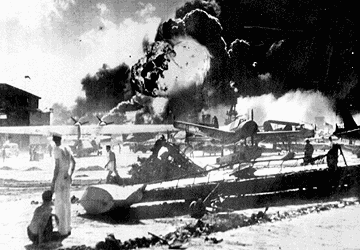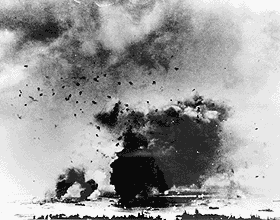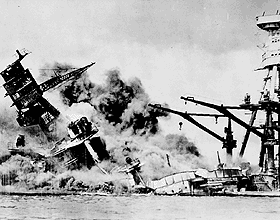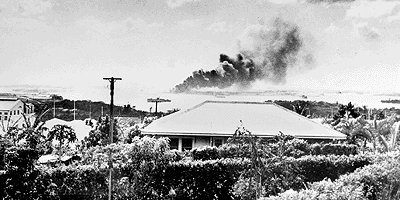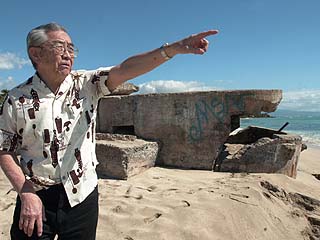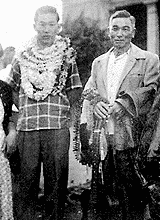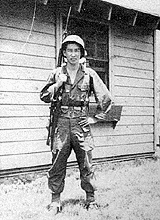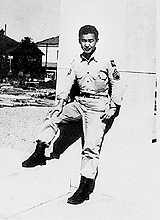 |

 
The stories begin the same way - early morning, blue sky, promise of a fine Sunday. Suddenly, low-flying planes, silence shattered. Pearl Harbor, O'ahu, Territory of Hawai'i. The blow to America 60 years ago rocked its soul and set it on a new course - one that plunged the nation into war and remade a generation. The events resonate on this anniversary, one that has kindled a desire to look back over the 60 years to contemplate the impact, to identify what changed - in particular for Hawai'i, and for anyone who was here the day Japan attacked America. Those who saw the attack have remarkable memories of Dec. 7, 1941. Among the images, the horror of seeing young sailors struggling in oil and flames in the waters along Battleship Row. There are flashbacks to the innocence of childhood - spellbound excitement in watching planes with red dots on their wings flying in formation, so low you could look into the pilots' eyes. And there's the sound of a voice on the radio, confirming the worst. There are shared and vivid memories. The fallout from that day for the United States was a long and savage war on foreign soil - frozen fields of Europe and bloody beaches of remote Pacific islands. Hawai'i was propelled toward a new destiny, sent along a far more prominent path in U.S. and international affairs. Confronted instantly, proud Americans of Japanese descent were made to endure unthinkable indignities but persevered because of their remarkable courage. Dec. 7 - the day, the moment - shaped countless lives over these six decades. The nation suffered one of its worst wartime losses, with 2,390 men, women and children killed in the attack. Of the casualties, 1,177 were from the USS Arizona alone and 49 were civilians at various locations around O'ahu. Many of the Pearl Harbor survivors took their memories with them to their graves, some rendered mute by the horrors they saw. Others passed the stories along to their children. Some found it impossible to stop thinking and speaking about that day. Among the veterans, many held out hope that Dec. 7 would not be forgotten, "Remember Pearl Harbor" their mantra. And this Sept. 11, few could help but link the date to another on which an attack reverberated so deeply into America's spiritual core. Sixty years later, it is with profound emotion that many Pearl Harbor survivors look back over a tapestry of time that includes twin tragedies anchoring distant points in the lives of so many of the nation's proudest citizens. There are compelling stories to tell of then and now, even as the number of Pearl Harbor survivors dwindles. Their message is one of courage, triumph and hope. | See memories, Page 3 'Never the same' State Rep. Ezra Kanoho remembers going to a University of Hawai'i football game the night of Dec. 6, 1941, and seeing a sentry carrying a flag with the words "Ever On Alert." The next morning, Hawai'i and the nation would realize the country was not alert enough. Today, many feel America was not alert enough to the threat of terrorist attacks. "I get the same kind of emotion, the disbelief," said Kanoho, now 74. As a teen, he watched the Pearl Harbor attack from the grounds of the Kamehameha Schools, convinced it wasn't real. "We thought, 'What a sham battle! This is great stuff,'" Kanoho said. Almost 60 years later, he watched televised images of jetliners smashing into the World Trade Center, killing thousands. Again, he had the momentary feeling that it couldn't be real. Kanoho recalls the radio announcement of war that followed the Pearl Harbor attack -- "like when the twin towers came down ... (realization) that the world will never be the same." In the Islands in 1941 - the Ground Zero of the day - war upended the status quo. The plantations and their owners, the Big Five corporations, suddenly were no longer in charge. The military was. The sleepy agricultural economy was immediately injected with vigor - the economic amphetamines of war dollars, new construction and massive in-migration. "By any standard measure of economic growth - in output, income or jobs - the Hawaiian economy expanded during the war years at a rate far faster than ever before or since," wrote economist Thomas Hitch in his book, "Islands in Transition: the Past, Present and Future of Hawai'i's Economy." And the society of Hawai'i was shaken by change that brought both opportunity and injustice. Neighbor Island plantation workers, frozen in their jobs at their pre-war pay, watched as Mainlanders were brought in to take high-paying defense jobs. "Haoles from the Mainland were brought in to work at Pearl Harbor, and the local people were screwed," said University of Hawai'i history professor Andy Bushnell, who teaches at Kaua'i Community College. In his book, "Working in Hawai'i: A Labor History," author Ed Beechert wrote that plantation laborers were sometimes assigned temporarily to government agencies such as the harbors division to work at higher-paying jobs, but that the workers only got their plantation pay and their employers kept the difference. People of Japanese ancestry were suddenly suspect. About 120,000 of them, both Japanese nationals and U.S. citizens, were incarcerated by a frightened nation. Young Japanese American men lined up to join the military when they were offered a role in the war, and when they returned as decorated veterans, they felt they had earned something. Many credit the returning veterans with insisting that the United States stop treating residents of Asian ancestry like aliens. University of Hawai'i botany professor emerita Isabella Abbott, who is Chinese Hawaiian, was forced to go through immigration when she went to college on the Mainland. She recalls being required to have her Hawaiian mother and others testify to prove she was born in the Islands. "That was something we had to undergo with a lot of frustration and tears. It was humiliating," Abbott said. The victory over this form of racial stereotyping "liberated Orientals," she said, and "instead of being downtrodden, they got some standing." Resentment over labor conditions fueled the remarkable postwar success of labor unions in organizing Hawai'i workers. The politically active unions, combined with newly active Japanese American veterans, helped overthrow the Republican-controlled territorial government. The result was nearly half a century of Democratic Party control in Hawai'i. 'The statehood issue' Pearl Harbor and the war opened the eyes of Hawai'i residents and in turn attracted the eyes of the nation. That's how, 60 years later, former University of Hawai'i president Fujio Matsuda and others see it. The attack on the mighty Pacific Fleet here changed Hawai'i from "some 'country' way out in the middle of the Pacific" to a place of immediate strategic importance for the nation, Matsuda said. It was now more than an obscure territory. "I think Pearl Harbor was one of the reasons that forced the statehood issue," said retired science teacher John Obata, 76, of Moanalua, who remembers watching the attack. Matsuda, 77, served in the Army, went to school on the GI Bill, became chairman of the University of Hawai'i's engineering school, director of the state Department of Transportation and later president of the University of Hawai'i. "If I didn't have the war experience, I don't know that I would have gone so far," Matsuda said. Like Matsuda, large numbers of Hawai'i residents went into the military. "For most of us, it was the first time out of the state. We got a notion of what the rest of the United States was like, and it gave us a chance to perform on a national and an international stage," he said. "We said, 'OK, we went and did our part for our country. We are full-fledged American citizens. Why can't we be a state?' It became a real issue for us. I think many of us felt that we deserved it." The valor of young Hawai'i veterans as well as the recognition of the strategic value of the Islands helped get statehood through, said Alexander & Baldwin chairman emeritus R.J. "Bobby" Pfeiffer, 81. "Hawai'i had more strength in Congress than it would have without the war. The members in Congress appreciated the fact that the veterans from Hawai'i had contributed so much," he said. Pfeiffer was a young supervisor working for Inter-Island Steamship Navigation on the Honolulu docks that Sunday morning when he saw smoke and heard the news of war on the radio. "We knew it was real. There was too much smoke not to be," said Pfeiffer, who would later head Matson and its parent firm, Alexander & Baldwin, the last of the Big Five to survive largely intact. 'The bombs that fell' It is the magnitude of what happened on Dec. 7, 1941 - still vivid for thousands who lived it - that propels the story of Hawai'i beyond the shores of a territory. One of the most significant chapters of the story, however, may be that the war taught Hawai'i and the nation a lesson on equality. It helped create the fabled racial "melting pot" in Hawai'i. "It broke down social barriers. Haole soldiers came in and started dating the local girls. The whole social system, the structure, started to be torn down," said author and educator David Penhallow, whose book, "After the Ball," is set around the time of the war. "The bombs that fell on Pearl Harbor during the morning of 7 December 1941 not only destroyed eighteen American warships, they shattered Hawai'i's insular complacency as well," wrote Thomas Creighton in his book, "The Lands of Hawaii: Their use and misuse." How did Hawai'i change? "We became part of the world," Penhallow said. And the nation was suddenly thrust into a world war, shaken by how vulnerable it was to enemy attack. There came martial law in Hawai'i, internment camps for Japanese Americans, a nation rallying behind the war effort, the loss of thousands more Americans on battlefields. Victory in the second world war. The memories and stories begin on a clear, idyllic Sunday morning in Hawai'i. The survivors of Pearl Harbor - military or civilian, men, women and children of that day - share a legacy. They remember horror, heartbreak, loyalty and courage. And in a kind of gift on this anniversary, as if from a time capsule, they share their stories.
By Will Hoover Consider this: Heading into the year 2002, Hawai'i remains both a U.S. territory and a Republican stronghold. The dominant economic force - agriculture - has diminished in recent years and is being challenged by tourism. Japanese Americans, the largest segment of the 750,000 people who live here, are not a particularly powerful force. The Hawaiian language is spoken in the streets. Hawai'i's military presence is insignificant, and few people in America have ever heard of O'ahu's naval base, Pearl Harbor. Preposterous? Not according to one of several local historians who recently engaged in a hypothetical exercise that pondered the question: "What if Japan had not attacked Pearl Harbor?" The idea behind this history exercise is that one way to comprehend how Dec. 7, 1941, has affected Hawai'i today is to imagine how the Islands might have fared had the attack never taken place. Would Hawai'i have ended up a major tourist destination with more than a million inhabitants 60 years after 1941? Not likely, says author and historian Glen Grant. To eliminate the Pearl Harbor attack, Grant reconstructs history this way: In the European war, the balance of power finally shifts and the good guys are victorious. In the Asian conflict, Japan, having toyed with the idea of attacking America's naval base in Hawai'i, wisely demurs. Cooler heads prevail and the country curtails its aggression against China and Southeast Asia. In time, stability is restored in Asia as well as in Europe. Throughout it all, Hawai'i is unaffected. Sunday, Dec. 7, 1941, is not strikingly different than Saturday, Dec. 6. Life in the mid-Pacific continues on its charted course. And that course is as a remote Republican outpost that produces pineapples and sugar cane. Power rests in the hands of a small number of men who run the "Big Five" companies that have dominated commerce and politics for decades. To be sure, change would come, says Grant. But without the "date which will live in infamy," it arrives altered and at a far more leisurely pace. "Without Pearl Harbor, the whole thrust for social change - the injustices for second-generation Japanese which grew out of World War II - wouldn't be there," concluded Grant. Without Pearl Harbor, the deprivations ushered in by years under martial law would not have left their mark, he says. There would never have been a massive military buildup and no large importation of Mainland civilian labor (the future first big wave of postwar tourism in Hawai'i). Japanese American Islanders would not have suffered the indignation of being branded unpatriotic. They would therefore not have felt compelled to prove themselves worthy, and, as a result, later instigate a major political shift for the Islands. Hawaiians would not have been discouraged from speaking their native language, as happened during the war. Thus, the language and other aspects of the Hawaiian culture would be prevalent today. Grant says that without Pearl Harbor, Hawai'i might even have remained a territory, because there would have been no driving force to propel it into statehood. Of course, there is more than one way to spin the past in order to imagine Hawai'i today without the scars of Pearl Harbor. Daniel Martinez, historian for the National Park Service's USS Arizona Memorial, agrees that the 1941 attack accelerated a great social upheaval. Without it, though, he envisions an outcome in stark contrast to Grant's. Had the bombs never fallen six decades ago, Martinez says, Japan's mighty military would have joined forces with Germany in Europe. Result: "Hitler wins the war - period," says Martinez. "Hawai'i becomes a possession of Japan because Japan has allied with Germany and gets the Pacific possessions. A dark cloud descends over the Pacific. The light goes out on democracy." After that, whatever the future held for Hawai'i would be almost too bleak to consider, says Martinez. Needless to say, statehood or status as a world-class, fun-in-the-sun vacation spot would not have been in the cards. "I've always believed that Pearl Harbor saved the democracies," said Martinez. "Because it forced the United States into the war, and we were the only ones left with enough industrial power, financial assets and military capability to assist the Allies in turning the tide." John Stephan, author of "Hawai'i Under the Rising Sun" and an expert on Japan's role in World War II, says Martinez's theory has some basis in fact. Until the summer of 1941, Japan's war plan was to move north and join forces with Hitler in attacking Russia. Then, on July 2, Japan changed its mind and formulated plans to invade southern Indochina (Vietnam) within weeks. That hostility prompted Roosevelt's embargo of oil to Japan, which initiated the chain reaction that led to Japan's attack on Pearl Harbor. But what if Japan had stuck with its original plan? Stephan says Hawai'i would have been spared attack. But America would have found itself in the incredible position of doing nothing as Japan and Germany polished off Russia. "How can Roosevelt persuade the United States to go to war to save the Soviet Union?" he asked. "The answer is he can't. Americans hate communism." Consequently, Japan and Germany divide Russia, and the world winds up with four great empires: 1.The United States, which controls North and South America. 2. Britain, which still has its empire in place. 3. Germany, which controls continental Europe. 4. Japan, which now controls Siberia, with its oil riches, as well as east and southeast Asia. "Where does that leave Hawai'i? Suspended precariously between two enormous powers, the United States and Japan. After the dust settles and the Soviet Union has been digested, who knows how Japan - flush with victory - will continue its southern movement?" Stephan says it's possible Hawai'i could have become the focal point of an immense battle that would have dwarfed Pearl Harbor and reduced O'ahu to a cinder cone, a la Iwo Jima. Or, to stave off attack and invasion, America might have fortified Hawai'i with such a Herculean military presence that it would barely be recognizable more than a half century later. Paul Hooper, head of the American studies department at the University of Hawai'i, lands somewhere between the extremes mapped out by Grant, Martinez and Stephan. Hooper says Hawai'i would have been pulled into the war even if Pearl Harbor had not been attacked. "The sentiment in this country was building to an anti-Japanese pinnacle, primarily because of Japan's invasion of China proper in 1937," said Hooper. "It's hard to believe that Americans would have totally turned their backs on that." Hooper says President Roosevelt eventually would have committed America to the war, regardless of how unpopular the decision might have been, because he was acutely aware of the peril of a German victory. Americans would have come to realize that what was at stake was freedom itself. Hooper acknowledges that under this scenario, neither martial law, which affected Hawai'i profoundly, nor the stigmatization of Japanese Americans would have taken place. "I agree that that would have made the outcome different," he said. "The attack on Pearl Harbor speeded up the process that created the social revolution and emotional surge that made Japanese Americans here first-class citizens." But, he added, "I think Hawai'i would still have been a major staging point in the war. And I can still imagine 400,000 troops stationed here, just as was the case. So I would say Hawai'i's status today - even without the attack on Pearl Harbor - would not be a heck of a lot different than it is."
In their own words Ramsay S. Hishinuma, 76, of 'Aiea was compelled, like dozens of others, to tell his story for the 60th anniversary of the Pearl Harbor attack, reflecting not only on the day, but on its impact over the 60 years. "Sixty years have gone by, but it seems like yesterday that I vividly remember and shudder to think how close I came to getting killed by Japanese warplanes strafing the West Loch area of Pearl Harbor where we sought temporary refuge on that fateful morning. This is no way to describe how scared this 16-year-old was on that terrifying day. "When I told my parents that my fellow members of the 'Ewa Speeders Athletic Club and I planned to camp out overnight on Dec. 6, I had no idea we were reserving ringside seats for the big show the following morning. Our ringside seats were at One'ula Park, known then as Hau Bush, just a few miles west of Pearl Harbor. "We were just about to eat breakfast when we heard booming sounds. Soon the sky became very black with heavy smoke, and we knew something unusual was happening. Shortly thereafter, two Marine Corps planes appeared, obviously in trouble. One crashed on the nearby road and the other plowed into the wooded area. We also saw a Japanese plane crash in the water a few hundred yards offshore. "Right above us, at just about tree-top level, we saw a plane with large red ball insignia on its wings and fuselage chasing a Barbers Point Marine dive-bomber. The machine-gun bursts from the Japanese plane were intense and ear-shattering. The Marine pilot was able to get out of his plane before he crashed, and he parachuted into the entanglement of nearby kiawe trees. He looked more than bewildered by the time we approached him and his first words were 'What the hell is going on?' We of course, were wondering the same thing. "One thing for sure, we were not safe on the beach, and we headed for the road to 'Ewa town. The road had been blocked by Civil Defense, so we sought refuge at Lower Village, across from the 'Ewa Plantation hospital. "But this was not a wise move, either, as Lower Village above West Loch was being peppered with shrapnel and bullets. Low-flying warplanes were strafing the moored ships nearby, and we were simply in the line of fire and getting fired on in a very intense way. It's a miracle how we were able to dodge all those bullets splattering the grounds nearby. We were scared out of our wits. We learned later that a 3-year-old was mortally wounded and a woman was hit in one arm that had to be amputated. "When the firing subsided, we ran into the nearby cane fields. It was dark from the heavy smoke blanketing the sky, we had difficulty seeing where we were going. Since then, any eclipse of the sun reminds me of Pearl Harbor day. "By the time we were able to stumble home, most of us were in a state of shock. I can vividly remember the look on my parents' faces, with tears streaming down in relief when they saw that I was unharmed and safe. "To this day, when I go past Lower Village, which has been leveled and converted to a modern subdivision, I try to visualize 'the spot' where my young life nearly ended, and my thoughts go back how close I came to being killed. "Since the attack, things changed drastically for our family, beginning with the internment of my father, who was a soldier in the Japanese army during the 1904 war with Russia. He immigrated to Hawai'i in 1907, seven years prior to World War I. "Early in 1943, I tried to volunteer for the all-Nisei unit, later known as the famed 442nd Regimental Combat Team, but was denied the chance to serve because I was underage at 17. In 1945, soon after I was reclassified from 4C to 1A, I was drafted into the U.S. Army and served my country as a member of the occupation forces in Japan. "During the early days of the occupation, I had a very unusual experience of meeting my cousin, who was a former kamikaze pilot who was demobilized when the war ended. For obvious reasons, he didn't seem happy to see me in a U.S. Army uniform. "As a 'survivor' of the Pearl Harbor attack, I feel very fortunate and blessed to be able to enjoy the so-called 'golden years,' but a scary thought still remains had I become a casualty of that terrifying and unforgettable day 60 years ago."
|
Main | Photo Gallery | Multimedia | Resources | Daily Stories
© COPYRIGHT 2001 The Honolulu Advertiser, a division of Gannett Co. Inc.
Use of this site indicates your agreement to the Terms of Service (updated 12/19/02)
